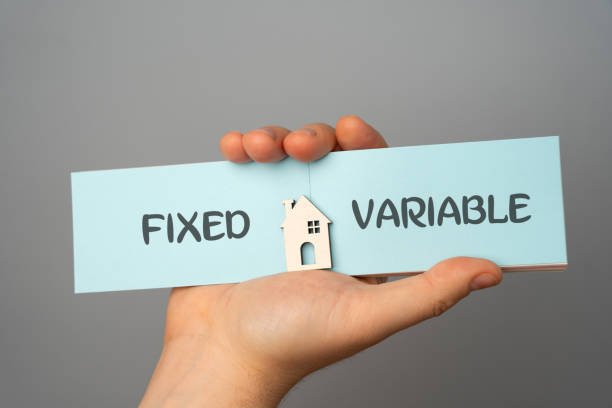
How to Choose Between Fixed vs. Variable Rate Mortgages
Choosing between a fixed and variable mortgage rate is one of the first — and biggest — decisions you’ll face when buying a home. It’s not just about which rate is lower today. It’s about what fits your lifestyle, finances, and how much risk you’re comfortable taking.
Let’s break down the difference between fixed and variable mortgage rates in Canada and how to figure out which one makes the most sense for you.
What’s the Difference Between Fixed and Variable Rates?
With a fixed-rate mortgage, your interest rate (and your monthly payments) stay exactly the same throughout your term — no surprises. It’s tied to the bond market, so rates are generally a bit higher upfront but offer long-term stability.
With a variable-rate mortgage, your interest rate can go up or down based on the lender’s prime rate, which moves in response to the Bank of Canada’s key rate. Depending on the type of variable mortgage, your monthly payments may stay the same — but how much goes toward interest or principal will shift.
📊 5-Year Outlook: Fixed vs Variable Mortgage Payments
Wondering how your mortgage payments might evolve? Here’s a sample flow of what 5-year payments could look like for fixed and variable rate options based on a $500,000 loan amortized over 25 years:
| Year | 🔒 Fixed Rate @ 5.24% | 📈 Variable Rate (starting 5.05%) |
|---|---|---|
| Year 1 | $2,989/mo | $2,920/mo |
| Year 2 | $2,989/mo | $3,045/mo (rate rises to 5.25%) |
| Year 3 | $2,989/mo | $3,130/mo (rate hits 5.50%) |
| Year 4 | $2,989/mo | $3,100/mo (rate dips to 5.40%) |
| Year 5 | $2,989/mo | $3,000/mo (rate lowers to 5.20%) |
📌 Insight: Fixed payments stay predictable. Variable payments may rise and fall with prime rate shifts, meaning short-term savings could be offset by mid-term hikes.
Pros & Cons of Fixed Rate Mortgages
Pros:
- Predictable payments that never change
- Easier to budget, especially if you’re risk-averse
- Peace of mind if rates rise
Cons:
- Higher upfront rate (usually)
- Costly penalties if you break the mortgage early
- Can’t benefit if rates drop mid-term
Pros & Cons of Variable Rate Mortgages
Pros:
- Historically cheaper over time
- Often lower rates to start
- Easier to break (lower penalties)
- Can switch to fixed if rates rise
Cons:
- Payments may shift if you have an adjustable-rate product
- More uncertainty in rising rate environments
- Risk of hitting your “trigger rate” where interest eats up all your payment
⚖️ Fixed vs Variable Rate Mortgages: Pros and Cons
Not sure whether to go fixed or variable? Here’s a side-by-side breakdown of the benefits and drawbacks of each option for Canadian borrowers in 2025:
| Feature | 🔒 Fixed Rate | 📈 Variable Rate |
|---|---|---|
| 🔍 Interest Rate Predictability | ✔️ Locked for full term | ❌ Fluctuates with prime rate |
| 💰 Initial Cost | ❌ Slightly higher starting rate | ✔️ Often starts lower |
| 📉 Risk Exposure | ✔️ Minimal – stable payments | ❌ Sensitive to rate hikes |
| 📆 Flexibility to Break | ❌ High IRD penalties | ✔️ Lower (3-month interest) |
| 📊 Best For | Risk-averse, budget-focused buyers | Flexible, financially confident buyers |
📌 Tip: If peace of mind is your priority, fixed is safer. But if you’re okay with potential rate changes and want to save in the short term, variable could win—especially if rates fall.
Still unsure which path is right for you? Try starting here: how to choose a mortgage rate in Canada for a full breakdown.
Already leaning toward fixed? Here’s how to decide between 3- and 5-year fixed terms.
How Often Do Variable Rates Change?
Variable rates move when the Bank of Canada updates its policy rate — eight times a year. Your lender adjusts their prime rate accordingly. These small tweaks can add up, which is why variable rate holders need to stay alert.
Historical Trends: Fixed vs Variable Rates in Canada
Historically, variable-rate mortgages have outperformed fixed-rate ones — especially when interest rates are stable or declining. But during periods of aggressive rate hikes (like 2022–2023), fixed rates have offered more protection.
📈 25-Year Mortgage Rate Trends: Fixed vs Variable (Canada, 2000–2025)
This historical overview compares 5-year fixed and variable mortgage rates across Canada since the year 2000. These long-term trends help highlight when each type performed best—and why timing matters.
| Year | Avg 5-Year Fixed Rate | Avg 5-Year Variable Rate |
|---|---|---|
| 2000 | 7.35% | 6.50% |
| 2005 | 5.79% | 4.75% |
| 2010 | 5.34% | 2.75% |
| 2015 | 2.74% | 2.10% |
| 2020 | 2.19% | 1.45% |
| 2022 (peak inflation) | 5.49% | 5.90% |
| 2025 (est.) | 4.89% | 5.20% |
📌 Insight: Historically, variable rates tend to outperform—but not always. During high inflation or sudden rate hikes (like 2022–2023), fixed-rate stability often wins out.
Shifting Preferences: What Are Canadians Choosing?
During the low-rate years of the pandemic, variable mortgages surged in popularity. But as the Bank of Canada raised rates rapidly, many borrowers started opting for shorter-term fixed rates (1–3 years) to ride out the uncertainty.
What If You Think Rates Will Change Soon?
If You Think Rates Will Increase:
Go with a fixed rate. You’ll lock in today’s rate and protect your budget from rising payments.
If You Think Rates Will Decrease:
A variable rate could help you pay down your mortgage faster as more of your payment goes to principal.
Why Some Canadians Are Switching from Fixed to Variable
With the gap between fixed and variable rates shrinking, some buyers prefer the flexibility of variable — especially if they might move, refinance, or break their mortgage early. Variable mortgages usually have much lower penalties (typically 3 months’ interest).
Short-Term Mortgages as a Middle Ground
Not sure which way to go?
A short-term fixed mortgage (like 1 to 3 years) can offer temporary stability while you wait out the market. Some even pair this with a variable product later to save money if rates fall.
Frequently Asked Questions
Can I switch from fixed to variable?
Only by breaking your fixed mortgage, which usually comes with a high penalty. But variable-to-fixed is often easier and cheaper.
What makes rates change?
Mainly the Bank of Canada’s overnight lending rate. When they raise it to fight inflation, variable rates climb too.
Why are 5-year terms so popular?
They’re a sweet spot between stability and rate discounts — and heavily promoted by lenders.
Wrapping It Up: Fixed or Variable?
It all comes down to your goals, finances, and risk appetite. If peace of mind and consistency matter most, go fixed. If you can handle some fluctuations and want to save on interest, variable could be the winner.
Still not sure? A mortgage expert can help you weigh the trade-offs and find what’s best for your life, not just the market.
Fixed or Variable? Let’s Find Your Best Fit
Choosing between a fixed or variable mortgage isn’t just about the rate — it’s about your comfort with risk, future plans, and monthly cash flow. Our mortgage experts can walk you through your options and help you decide with confidence. Get Personalized Advice on Fixed vs. Variable
Stuck with a Mortgage Decision?
Don’t stress — our team is here to help. Reach out for free, no-obligation guidance.
Contact the Experts



